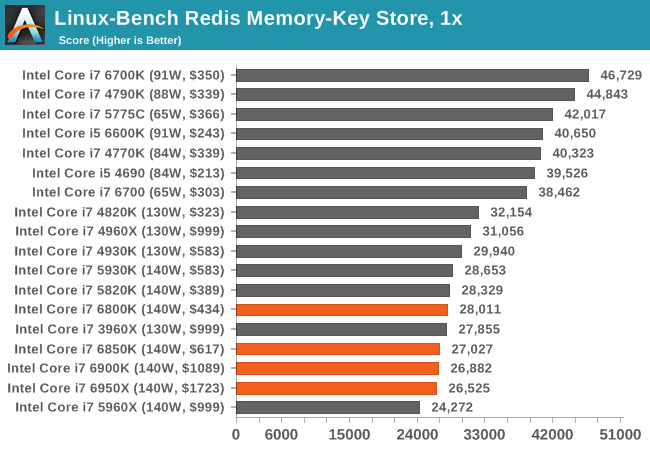The Intel Broadwell-E Review: Core i7-6950X, i7-6900K, i7-6850K and i7-6800K Tested
by Ian Cutress on May 31, 2016 2:01 AM EST- Posted in
- CPUs
- Intel
- Enterprise
- Prosumer
- X99
- 14nm
- Broadwell-E
- HEDT
Linux Performance
Built around several freely available benchmarks for Linux, Linux-Bench is a project spearheaded by Patrick at ServeTheHome to streamline about a dozen of these tests in a single neat package run via a set of three commands using an Ubuntu 11.04 LiveCD. These tests include fluid dynamics used by NASA, ray-tracing, OpenSSL, molecular modeling, and a scalable data structure server for web deployments. We run Linux-Bench and have chosen to report a select few of the tests that rely on CPU and DRAM speed.
C-Ray: link
C-Ray is a simple ray-tracing program that focuses almost exclusively on processor performance rather than DRAM access. The test in Linux-Bench renders a heavy complex scene offering a large scalable scenario.

NAMD, Scalable Molecular Dynamics: link
Developed by the Theoretical and Computational Biophysics Group at the University of Illinois at Urbana-Champaign, NAMD is a set of parallel molecular dynamics codes for extreme parallelization up to and beyond 200,000 cores. The reference paper detailing NAMD has over 4000 citations, and our testing runs a small simulation where the calculation steps per unit time is the output vector.

Redis: link
Many of the online applications rely on key-value caches and data structure servers to operate. Redis is an open-source, scalable web technology with a strong developer base, but also relies heavily on memory bandwidth as well as CPU performance.
[words]












205 Comments
View All Comments
mapesdhs - Thursday, June 9, 2016 - link
By definition, professionals wouldn't use this kind of tech at all. Pro users don't oc. Pro users have a budget to afford XEON.The prosumer market though, solo professionals, those on a budget, these are the people for whom previous generations of SB-E/IB-E made some sense, but not anymore.
sleekblackroadster - Tuesday, May 31, 2016 - link
This is the opposite of generating enthusiasm, Intel.jjj - Tuesday, May 31, 2016 - link
This is what Intel means by more focus on certain segments and it will only get worse as the PC market fades away.damianrobertjones - Tuesday, May 31, 2016 - link
No 6700k in the tests? :(damianrobertjones - Tuesday, May 31, 2016 - link
Clicks the next page... DAMMIT!PJ_ - Tuesday, May 31, 2016 - link
It was in the GTA V benchmarks for examplePJ_ - Tuesday, May 31, 2016 - link
And many moremedi03 - Tuesday, May 31, 2016 - link
AMD's CPUs aren't that bad for gaming (mostly because of multi-threading becoming a treand in games, thanks to consoles) as many people think:http://wccftech.com/fx-8370-i5-6400-gaming-compari...
josetesan - Tuesday, May 31, 2016 - link
It will be great if , for next multi-threaded tests, Linux Kernel compilation times were added, as thay make great use of it, via the -J <threads> parameter.Some people use their computers to compile,and we benefit for multicores a lot. ( java, C, whatever ).
I can see the 6-core for $434 it a nice price, given Haswell i7-4770 has 4 cores and is similar priced.
Great review, indeed.
Tom Womack - Tuesday, May 31, 2016 - link
It's not clear that the 6-core Broadwell is very much better than the 6-core Haswell, and it's likely that its existence makes the 6-core Haswell cheaper; so pick up a 5820K in the near term.